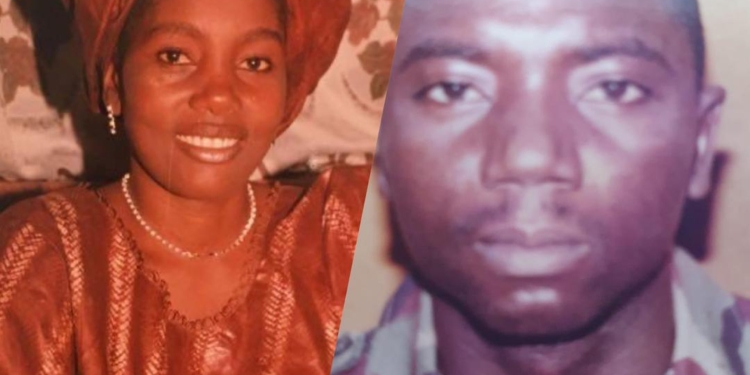By Zainab Jobarteh
Mariama Marong Baldeh has never believed that her husband was a coup plotter. But for more than 20 years, she dared not say anything in defence of Basiru Barrow, murdered and branded a coup leader.
That is, until the Truth, Reconciliation and Reparations Commission (TRRC) hearings opened the way for the truth about Basiru Barrow’s execution to be told.
Mariama remembers March 27, 2018, as a special day. That is the day she and her co-wife, Sunkary Yarboe, testified at the TRRC about their husband’s death. She describes it as the best day of her life, a day she had always longed for so that Gambians would know that everything they had been told about her husband was a lie.
She has always been sad that her husband was never given a chance to defend himself. She remembers the case of Sanna Sabally, one of Basiru Ballow’s accusers. Years after Basiru’s death, he was arrested for plotting a coup, but he was not killed. Yes, he was tortured, but he was given a chance to clear his name before the people. Basiru did not get that privilege.
“But we did it for him, and it made me the happiest woman in the world,” Mariama says.
On November 12, 1994, the Armed Forces Provisional Ruling Council (AFPRC), which had taken power in a military coup barely four months earlier, announced that several soldiers who had attempted to overthrow their government on November 11 had been killed. They claimed that the mutineers were led by Lieutenant Basiru Barrow and Lieutenant Abdoulie Faal.
Although in shock, Mariama’s immediate reaction to the news was, and has over the years remained, “He is not the kind of man who can overthrow a government. He is special.”
She was finally vindicated when several witnesses at the Truth, Reconciliation and Reparations Commission narrated what really happened. Subsequent testimony, including that of former junta members Sanna Sabally and Edward Singhatey, has indicated that there was no discernible coup attempt in November 1994, just the paranoia of Yahya Jammeh and his fellow coup makers.
But the label of coup plotter brought suffering to Basiru’s family. Speaking to me in her pharmacy along the Banjul Brikama highway in Talinding, Mariama, Basiru’s second wife, recalls that day in November 1994.
I had read Mariama’s statement before our interview and had expected her to be just another desperate victim, waiting for reparations to get back on her feet. But the calm and collected woman I met was quite different. It was difficult to imagine that this thriving business belonged to a victim of Jammeh, a woman who had once had everything snatched from her in the blink of an eye. She told her story in articulate English.
She married Basiru Barrow when she was just 18 and in nursing school. They lived in Bakoteh and were together for almost five years before he was killed.
She remembers junta member Sanna Sabally announcing on the radio that several soldiers had attempted to overthrow the AFPRC government. He explained that some had been arrested and others killed. It never crossed her mind that her husband would be among them.
“Unfortunately, by the end of the day, we came to know that he was.” AFPRC announced that Basiru Barrow was the ringleader and that he had been killed.
This came as a great shock to Mariama. She had not noticed anything to make her suspect that her husband, whom she describes as a caring, humble, trustworthy, and patriotic citizen of The Gambia who would do anything to safeguard the integrity of his country, was going to attempt a coup. She did not believe what they were saying on the radio.
She recalls that Basiru had once come home looking unhappy. When she asked him what was wrong, he said he had attended a meeting of the AFPRC. Apparently, the council members had decided to renege on their promise to return the government to the country’s civilians after six months. They wanted to continue ruling. Mariama told him to resign if he was not happy with the decision, but his response was, “It does not work like that in the army.”
“He was a soldier with a difference. He was young and he was everything to his family,” she remarks.
Our interview was interrupted several times, once by a man with a bleeding finger, another time by a woman with a sick baby. Mariama excused herself to serve some of her clients. She appeared to like taking care of them herself even though she has two assistants.
Mariama remembers that after the news had broken, people kept coming to their house to confirm if Basiru was indeed involved in the coup. Some were

genuinely concerned, but many others just wanted something to gossip about. Her answer to all of them was the same: Basiru was not part of that group.
Even after BBC’s Focus on Africa announced Basiru’s name among the people who had been killed during the alleged coup attempt, Mariama still refused to believe he could be involved. She suspected that members of the junta were wary of Basiru because he was popular among the young soldiers, who respected him, and therefore had decided to neutralise the possible threat he posed to their hold on power.
The family’s request to be given his body so that they could arrange a decent burial for him was turned down. Instead, his wives were arrested and hauled to the National Intelligence Service (NIA) for questioning.
Mariama was traumatised. She had just lost her husband in a terrible way, but was given no explanation, no chance to mourn in peace and come to terms with the tragedy. Instead, the government that had killed her husband was trying to harass her.
Mariama remembers two NIA officers taking turns to interrogate her, trying to put words in her mouth. “They wanted me to say things I knew nothing about. They know I was close to my husband, so they thought he had told me of his plans to overthrow the government.”
She does not know the officers who came for her house, but she remembers seeing Sanna Sabally and Edward Singhateh at the NIA office.
Mariama thought the two hours of interrogation were traumatic. She did not know that worse was to follow. Tears run down her cheeks as she remembers life after the death of her husband. “Being a single mother in this country, nobody was there for me; nobody wanted to associate with me. This included some family members who were working with Jammeh. It was a difficult moment for me but I had to tighten my belt and be strong for my kids,” she says as she wipes away the tears.
She would be in a public service vehicle and hear people say bad things about her husband, but could not even defend him because she was afraid of being targeted. People avoided the Barrow family because his image was tarnished. He was remembered as the man who was killed trying to overthrow the president.
Mariama, a young mother with two little girls, had to start all over again. Her salary as a nurse at the Royal Victoria Teaching Hospital in Banjul was not enough to take care of her family. Then she had to quit her job after being threatened by one of her husband’s subordinates, Almamo Manneh. According to Mariama, Almamo accused her of not treating his wife well when she was admitted to the ward she [Mariama] was in charge of. He accused her of sabotaging the government. She got scared because Almamo was a close associate of Jammeh’s and she was afraid that she would come under the surveillance of the government.
Several witnesses at the TRRC have implicated Almamo Manneh in torture and extrajudicial killings.
So she went to work for a private pharmacy. She put in long hours to ensure that her children were taken care of.
Mariama refused to feel sorry for herself. She knew her husband would have made sure that his family lacked for nothing. She told herself that accepting her husband’s death included taking care of their children. Giving her two girls the best education possible was her priority. “They did not wear fine clothes during festive occasions, but they went to good schools,” she says, adding that her husband would be proud of how his children were brought up.
She worked at Stop Step Pharmacy [one of the biggest in the country] for about 10 years from 2002. In 2013 she decided to set up her own small pharmacy. Mariama cannot help smiling as she remembers those first days as her daughter, who had just completed high school, helped her. They made small sales as they painstakingly built their customer base. She had learned a lot about dealing with customers during her years at Stop Step and had a lot of support. “Though I did not have the type of drugs Stop Step had, I tried to give good service,” she said.
Even though she and her daughters faced many financial difficulties, Mariama never gave up. Her daughter was one of the best students in The Gambia, but she was never given a scholarship, as was the custom of the Yahya Jammeh regime. Every time interviewers realised she was the daughter of Basiru Barrow, they would quickly turn her down. Mariama had to sell a parcel of land her husband had left her to finance her daughter’s education in the US. The girl is now studying for a PhD in biology and immunology.
Mariama says she hopes the TRRC’s recommendations will be in the interest of the victims, and that they will be implemented. Her family has not yet been compensated, but she is grateful for the opportunity to speak.
Her wish, and that of the whole family, still stands, even after all these years: that Basiru Ballow’s remains be handed over so that they can give him a befitting burial.







